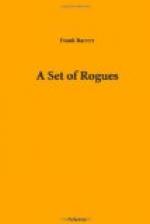’Twas close upon nine o’clock when we reached the little town, and not a soul to be seen anywhere nor a light in any window, but that troubled us not at all (having provided ourselves with a good store of victuals before quitting Alger), for here ’tis as sweet to lie of nights in the open air as in the finest palace elsewhere. Late as it was, however, we could not dispose ourselves to sleep before we had gone all round the town to satisfy our curiosity. At the further extremity we spied a building looking very majestic in the moonlight, with a large garden about it enclosed with high walls, and deciding that this must be the residence of Ali Oukadi, who, we had learnt, was the most important merchant of these parts, we lay us down against the wall, and fell asleep, thinking of our dear Moll, who perchance, all unconscious, was lying within.
Rising at daybreak, for Dawson was mightily uneasy unless we might be breaking the law by sleeping out-of-doors (but there is no cruel law of this sort in Barbary), we washed ourselves very properly at a neighbouring stream, made a meal of dry bread and dates, then, laying our bundles in a secret place whence we might conveniently fetch them, if Ali Oukadi insisted on entertaining us a day or two, we went into the town, and finding, upon enquiry, that this was indeed his palace, as we had surmised, bethought us what to say and how to behave the most civil possible, and so presented ourselves at his gate, stating our business.
Presently, we were admitted to an outer office, and there received by a very bent, venerable old Moor, who, having greeted us with much ceremony, says, “I am Ali Oukadi. What would you have of me?”
“My daughter Moll,” answers Jack, in an eager, choking voice, offering his letter. The Moor regarded him keenly, and, taking the letter, sits down to study it; and while he is at this business a young Moor enters, whose name, as we shortly learnt, was Mohand ou Mohand. He was, I take it, about twenty-five or thirty years of age, and as handsome a man of his kind as ever I saw, with wondrous soft dark eyes, but a cruel mouth and a most high, imperious bearing which, together with his rich clothes and jewels, betokened him a man of quality. Hearing who we were, he saluted us civilly enough; but there was a flash of enmity in his eyes and a tightening of his lips, which liked me not at all.
When the elder man had finished the letter, he hands it to the younger, and he having read it in his turn, they fall to discussing it in a low tone, and in a dialect of which not one word was intelligible to us. Finally, Ali Oukadi, rising from his cushions, says gravely, addressing Dawson:
“I will write without delay to Sidi ben Ahmed in answer to his letter.”
“But my daughter,” says Dawson, aghast, and as well as he could in the Moorish tongue. “Am I not to have her?”
“My friend says nothing here,” answers the old man, regarding the letter, “nothing that would justify my giving her up to you. He says the money shall be paid upon her being brought safe to Elche.”




